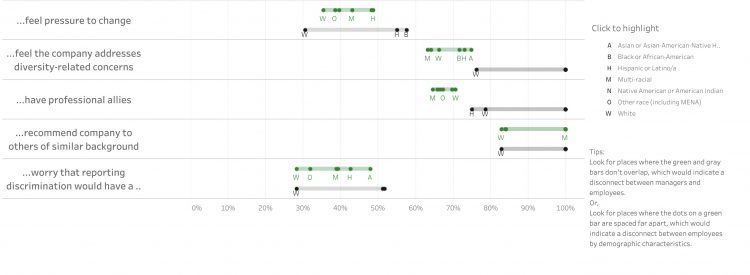I love my job. CEOs get far too much credit (and sometimes too much blame) because we get to make the final calls on strategy, product, marketing, M&A, hiring, etc. The no-brainer decisions get made before they ever get to you—it’s the risky ones that need your stamp of approval. I get adrenaline from sitting in the hot seat, but it isn’t the most important part of my job.
My ability to inspire our cross-functional teams to achieve outsized goals is what defines my leadership. I don’t write algorithms or ship products. I don’t keep our sites running at 99.997% uptime or help our customers on their hardest projects in crunch time, but I’m smart enough to know who does. When I get it right, we thrive. When I fall short, well… I still get to interact with smart, motivated people every day.
We have a diverse group of almost 1,700 employees sitting in six different time zones around the world. Getting a real-time pulse on what they think of our strategy, leadership, values, and outlook is not easy. Zoom and Slack are awesome, but they aren’t the same as walking the halls. Here’s what I’ve learned: our employees’ experiences are vastly different based on their role, background, location, tenure, ethnicity, values, etc. And my ‘gut’ isn’t nearly as accurate as doing the primary diligence (like skip-levels, town halls, surveys, mentoring, and so on).
Not all executives realize this. Our research team just released a new study about leadership, employee experience, and diversity, equity, and inclusion (DEI)—a sweeping survey of over 6,000 professionals. The data made one thing clear: many executives are painfully out of touch. The implications are both dangerous and disappointing.
Below, I will highlight a few key findings. If you’d like to see the data in its entirety and explore different filters and visualizations, visit our Tableau dashboard.
What managers believe vs. what employees really feel
In our research, we asked employees about their perceptions at work and managers about how they thought their teams felt. The responses revealed a painful delta between managers’ expectations and their employees’ lived experiences—a divide that was even more pronounced when we considered respondents’ race.

Here are just a few examples of misalignments:
- Only 30% of white managers said that they believe that their diverse employees feel pressure to change aspects of their behavior or appearance to fit into their workplace culture—while almost 50% of Latinx workers reported that they did.
- While almost 80% of leaders thought diverse employees have “professional allies,” only 61% of Latinx, 63% of Black, and 62% of multi-racial employees were inclined to agree.
- Less than 30% of white managers think employees worry that reporting discrimination would have negative effects for them, but almost half of Asian employees do exactly that.
While these are some of the most dramatic divergences, managers (even those from racially or ethnically diverse backgrounds themselves) had a rosier perspective about employee experience than their workers in almost every category.
When we asked explicitly whether they think their leadership is out of touch with diverse employees’ needs, people from every marginalized group (women, people of color, those with disabilities, LGBTQ+, veterans) were more likely to say yes. Almost half of entry level workers agreed.
To some extent, this isn’t surprising. As leaders, we have a responsibility to ensure our teams can thrive, and no one wants to feel like they aren’t succeeding at their job. But at the same time, the size of the misalignment should be a wake up call for us that we don’t always have insight into how our employees actually experience work. We need to take steps to proactively learn more about their experiences.
Leadership needs to step up
One area that feels like a glaring miss is the delta between what employees and managers value. Most people want businesses to prioritize diversity, equity, and inclusion. Our previous research found that 62% of consumers want companies to speak out on political and social issues, and nearly 80% want to work for a company that cares about DEI.
According to the newest data, a majority of workers (62% overall) consider DEI to be “an important factor in our company’s ability to drive success.” This was true of people from every racial background and job level—up until the executive level. This isn’t a revelatory insight; we know that these are issues people care about.
But by contrast, only 48% of C-level executives said the same, and almost half actually went so far as to consider DEI “a distraction from our company’s real work.”
This statistic surprises me. As any good leader should understand, diversity, equity, and inclusion is your real work. It’s what enables your employees to feel comfortable enough to do their jobs well. It’s how you’re able to design products that support all different types of customer needs. It’s how you build a company full of people who have empathy for your customers and each other. It’s how you innovate and shape what’s next.
DEI is associated with better business performance, innovation, and employee happiness. What could be more important than that?
Too often you hear executives talk about DEI as if the initiatives are in lieu of driving business outcomes. Not so. I talk to our teams all the time about the importance of hitting financial goals, taking ownership, delivering for shareholders. Our team understands that if we don’t hit our financial targets and meet our OKRs, another CEO will sit in my seat. Being a leader in DEI doesn’t restrict business performance—it enables it.
What comes next: giving every employee a voice
There is still cause for optimism. Many of our findings showed that employees feel supported by their companies, if not understood by their leaders. More than 80% would recommend their company to a person of their background and 67% find their employer’s DEI work meaningful. Clearly, People teams, ERGs, and DEI professionals out there are making a positive impact.
It’s time for leadership to take a step back and learn something from them. We need to amplify, sponsor, and reward the people doing this work, especially since in many cases it involves people going above and beyond their regular responsibilities.
I know that there are good, DEI-focused business leaders in the world. I’m inspired by our board member and Wharton’s Dean Erika James and others like her who make DEI a core part of their values and act as vocal public advocates. I’m also made hopeful by young and future leaders; Wharton’s incoming MBA class is more than 50% women for the first time in the school’s history. We can and must be better.
Companies can only truly thrive when everyone has a voice. For this to be a reality, we need to fundamentally reimagine systems that have historically restricted those voices. We need to hold leaders accountable. We need to use data, not instincts, to decide what is best for our employees and relentlessly pursue a more equitable and just place to work. Momentive is committed to doing just that.
Explore the data yourself.
An interactive Tableau dashboard enables you to see the responses yourself and gain more insights.



